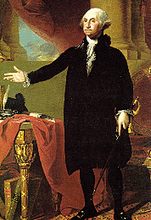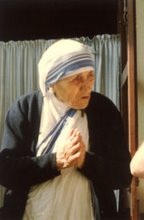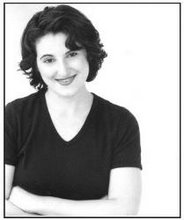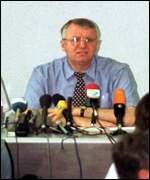Great going, USA: Young Albanians reject Serb friendship (from April)Sixty-five percent of young Kosovo Albanians say they would never be friends with Serbs, a UN survey showed.
Reuters reports that the poll underscored the province’s divide despite Western promises to create a multi-ethnic society.
“The ethnic-based conflicts of the 1990s had a significant impact on young people’s ability and inclination to interact with people from other communities,” the UN Development Program (UNDP) said in the report released on Wednesday.
Twenty-five percent of young Serbs rejected the idea of being friends with Kosovo Albanians.
Just over 54 percent of Kosovo Albanian youths questioned said they would not want to be neighbors with Serbs.
I wonder if the following has anything to do with it: the American-initiated NATO peacekeeping force has been keeping the peace by checking off areas as “cleansed” once the last Serbs have been pushed out. I’m not making this up; it’s going to be mentioned in a book that’s due out very soon, written by a UN worker there. Peacekeeping “progress” literally happens when there are no Serbs left in an area of Kosovo.
I’ve said it before and I’ll say it again: When Americans take on that “global” outlook the world wants them to have, they are conned into sponsoring tribalism and ethnic supremacy.
(Of course, you'll note she seems to ignore the significance in her own citation that at least 25% of all Serbian kids-and in one source I've seen it's 30%-feel the same way towards Albanians....) Now my gut level reaction to this, not surprisingly, is "Gee, I wonder why?" But then I remind myself of one important fact, one that everybody on both sides of the equation needs to remind themselves of as well: Albanians and Serbians have lived next and alongside with each other for over a millenium, and despite all the rhetoric, that's not likely to change anytime before, oh, say judgement day. Sometimes that co-habitation has been relatively peaceful; much of the time it has not. But whether it is peaceful in the future or not relies at least as much if not more so on everyday people as it does governments and political groups. Which is why I found this article so heartening:
************************************************************
Kosovo students learn about tolerance at Dobbs Ferry school
DOBBS FERRY — Some students at Our Lady of Victory Academy yesterday couldn't help looking at four visiting teenagers from the faraway, tension-filled land of Kosovo as something like heroes.
The visitors, after all, lived through some terrible times as children, especially when Serbians killed thousands of ethnic Albanians in Kosovo during the late 1990s.
Since then, they've watched their province cautiously rebuild, knowing that ethnic tensions - or worse - can erupt at any time.
Today, the four students, three Albanian Muslims and one Serbian Christian, are committed to helping build a new Kosovo of peace and tolerance. They've come to the United States to tell their tale and see how Americans of so many ethnic backgrounds live side by side.
"In the U.S. these days, there's so much drama, controversy, over religion and race, everything," said Jasmine Perez, 16, of Yonkers. "So it's beautiful to meet people from another country where it must be really hard."
During a lunch of burgers and fries, Milos Adzanic, 17, the Serb visitor, explained what he would tell people when he returned home.
"When I return to Kosovo for peace-building, I will say I've seen that it's possible to live together regardless of race, ethnicity, gender," he said through a translator. "I will say that I have returned from a county where this concept works."
The students are visiting only two U.S. high schools, one in Washington and Our Lady of Victory, an all-girls Catholic high school run by the Sisters of Mercy. They earned the trip by winning an essay contest, and were brought over to promote "conflict resolution" by Catholic Relief Services, the National Catholic Educational Association, and the U.S. Agency for International Development.
Kosovo, a region in southern Serbia, has been under United Nations protection since a NATO bombing campaign in 1999 ended fighting between Serb troops and Albanians seeking independence.
About 90 percent of Kosovo's residents are Albanian Muslims. But its Serbian community opposes sovereignty for Kosovo.
Kosovo Albanians have been threatening to declare independence of late. Just yesterday, Serbian President Boris Tadic said such a move would create a "frozen conflict."
But Kosovo is a young region, with more than 60 percent of its population under 25. And young people hope to teach Albanians and Serbians - Muslims and Orthodox Christians - to build a new, tolerant future.
"Tolerance was a taboo topic," said Alban Mehmeti, 19, who is involved in a Kosovo program called Our Tomorrow. "It's a conflict of generations, with older people who are more Kosovo-centered or Serbia-centered. The young are carrying the change that is happening."
Stephany Aguilar, 15, of Yonkers sounded truly impressed by the visitors' commitment and vision.
"They want to make peace, face problems, while other people don't want to do this," she said. "They want to do good for their country."
At at a time when many Muslims charge that the United States is fighting a war against Islam, the Muslim students from Kosovo thought otherwise. They see the U.S. and NATO as responsible for saving Muslim lives.
"Especially in Kosovo, America is seen as a place promoting humanity and having a positive involvement," Dardene Ceku, 19, said through an interpreter.
Mehmeti wanted to focus on U.S. involvement in Kosovo and not anywhere else.
"The role of the United States in Kosovo is very important, very meaningful," he said. "The U.S. is the most democratic state in the world, which is the reason why."
The students attended a class focused on social justice taught by Ellen Brickwedde, who visited Kosovo in July with Catholic educators. Yesterday, she recalled staying with a Kosovo family and wondering, "How could anybody want to kill these people?"
She also visited a Serbian school, where one teacher asked her to spread a message at home: "Tell them we're not all mean," she said.
Brickwedde, whose classroom sports bumper stickers like "And WHAT difference do YOU make?" and a map of genocides around the world, said the Kosovo students brought an important message about overcoming obstacles to pursue peace.
"We want our kids to become compassionate and caring people who can make a difference in the world," she said.
********************************************************Now, as the title of this blog post implies, something like this, however significant it may be, is but "one small step". And by itself, I fear it won't accomplish much. I earnestly do believe that there must be some sort of "reconcilliation" process that must take place as well. Whether it's along the lines of "Truth and Reconcilliation" committees that have been set up in South Africa and elsewhere, or another model is used, the bottom line is that some sort of recocilliation process is necessary IMO, or lasting peace will be impossible. But at the same time, what was going on with the kids in the above article is also a necessary part of the process towards peace and stability as well.





















No comments:
Post a Comment